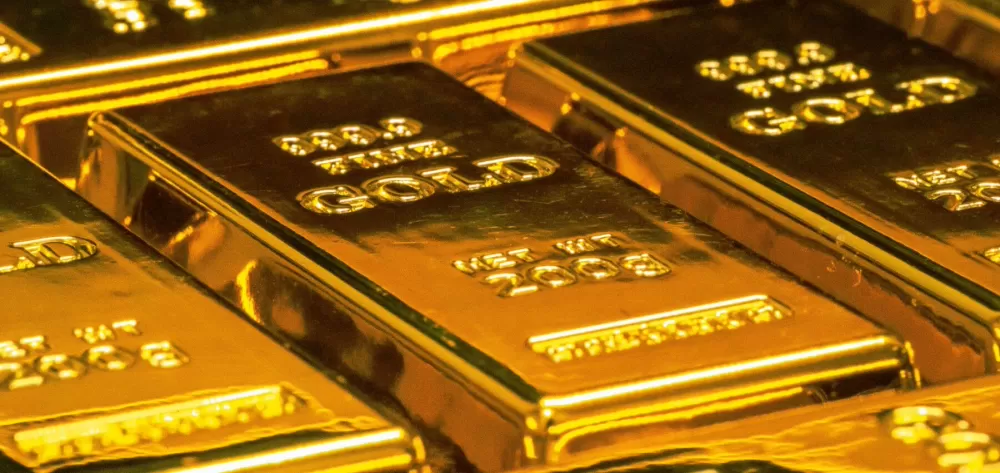Gold as a commodity is particularly sought after in times of crisis. There are few other assets which enjoy the same repute as a safe haven for investors. If you had bought gold in 1971 at the going price of 170 francs an ounce and held it until the end of 2020, you could make a 600-franc return on that investment, after accounting for inflation.
Had you had placed that 170 francs in a savings account instead, your return between 1971 and the end of 2020 would be just 3 percent after inflation. In other words, your return for the full 50-year investment term would be around 5 francs.
But the performance of gold pales when compared to that of Swiss stocks. According to the historical return calculator from moneyland.ch, a 170-franc investment in the Swiss stock market in 1971 would have grown into 2700 francs by the end of 2020. That is a return of 1500 percent, after inflation.
But although gold is not the most lucrative investment there is, it remains popular on global exchanges. This article explains why gold is so popular, and which factors affect the price of the yellow metal.
Inflation
Gold is believed to hedge against rising inflation. Investors purchase gold in times of crisis with the aim of protecting their wealth. This, in turn, results in a high demand for gold during periods of crisis, which can drive up the gold price.
The theory is that because gold, in contrast to fiat currencies, is not bound to a central bank and requires a great deal of effort to mine, its value will remain largely stable. Resultingly, when the value of a currency goes down, the value of gold climbs. When, for example, a central bank creates additional money, the price of gold in that currency will automatically increase.
But the historical developments do not show a reliable correlation between inflation and the price of gold. So there is no guarantee that gold will gain in value when currencies are subjected to inflation. However, the fear of inflation typically does result in a stronger demand for gold, regardless of whether or not those fears prove themselves to be founded.
Interest
With very few exceptions (see gold leasing), gold yields neither interest nor dividends. On the contrary, depending on how you invest in gold, your investment may be accompanied by substantial costs. For this reason, gold loses in popularity when interest rates are high. In a high-interest environment, investors tend to sell their gold and reinvest in ways that return higher yields. For that reason, gold sometimes becomes cheaper when interest rates climb.
Likewise, the gold price primarily goes up when real interest rates become negative – meaning inflation rates are higher than bank interest rates. The price of gold may even rise when investors are simply expecting interest rate cuts by central banks. This too shows that investors are most likely to purchase gold when inflation devaluates their money.
Dollar rates
International gold markets trade in US dollars. Even the gold prices published by the London Bullion Market Association twice every trading day are in dollars. Because of this, the dollar-franc exchange rate is a factor which must be accounted for if you want to invest in gold using Swiss francs – much as with other investment vehicles denominated by foreign currencies.
When the US dollar loses value against the franc, gold too indirectly becomes cheaper in Swiss francs. However, a weakening dollar can potentially drive the price of gold up again as international dealers generally increase their gold purchases in this situation.
The stock market
Gold appeals to risk-averse investors. Because of its status as a safe haven for wealth, demand for gold – and subsequently its price – rises when international market outlooks are bleak. This is true regardless of whether the reasons underlying crises have economic, political, or other origins. For example, the price of gold reached record highs in the years following the 2008 financial crisis or during the war in Ukraine.
In these situations, many investors try to move their assets to less speculative investment vehicles. That is why the gold price remains stable or even rises during periods when uncertainty reigns and stock market indexes weaken. But although gold has historically proven to be a relatively stable investment, the many factors which affect the price of the precious metal can result in major volatility.
Demand for commodities
Gold is not only used as an investment vehicle. As a physical commodity, it is also used in the manufacturing of many goods. Because of that fact, its value is also affected by the real economy. Approximately half of the annual demand for gold comes from the jewelry industry – particularly in China and India – and not from investors. Gold is also used in various hi-tech industries, such as the manufacturing of electronics and pharmaceuticals.
The Indian wedding season, which begins in autumn and extends until the end of the year, is one of the main reasons why demand for gold increases during that period. But jewelry manufacturers do not necessarily buy gold when demand is high, but often try to purchase it when prices are low. That is why the heightened demand does not automatically result in huge spikes in gold prices in the second half of the year. Instead, the countercyclical purchases result in an equalization of the gold market throughout the year.
Cryptocurrencies
Some analysts see a connection between the gold price and demand for cryptocurrencies – and bitcoin in particular. The reason for this is that, like gold, they see cryptocurrencies as a hedge against inflation. This is because, unlike fiat currencies, the production of new units of cryptocurrency is generally limited.
In the recent past, banks have observed investors transferring their wealth from gold to bitcoin and vice versa. The cryptocurrency is often referred to as digital gold. But the use of cryptocurrencies as gold-like investment vehicles can also have adverse effects on prices. During times when investors favor precious metals over cryptocurrencies, gold prices are likely to go up and the bitcoin price will likely go down. On the other hand, gold may lose in value during times when investors favor cryptocurrencies.
But gold price fluctuations resulting from cryptocurrencies would likely be relatively small. For one thing, the 15-trillion-dollar market capitalization of gold is 10 times larger than that of bitcoin. So accordingly, even major fluctuations in the cryptocurrency market only have a moderate impact on the gold market. Another factor is that investors primarily buy cryptocurrencies like bitcoin as speculative instruments, and not because they want to stop investing in gold.
Correlations
Because the price of gold depends on all of these varied factors, correlations can be very complex. For example, in the past analysts have determined that the price of gold can skyrocket even in time of rock-bottom demand in the jewelry market – even though the jewelry market normally accounts for half of the global trade in gold. As with many other investment assets, observing just one price-determining factor will not provide a clear picture of the gold market.
Additionally, the influence of any individual factor can be difficult to track. For example, although the correlation between inflation and the gold price is weak, for many investors fear of inflation is a primary motive behind investing in gold.
There are also numerous speculative correlation theories, some of which are the subject of ongoing debate. For example, market observers theorize that there may be a correlation between the gold price and the cost of crude oil. The prices of both these commodities often follow similar patterns. But many other analysts see the similarities as the result of both commodities being affected by similar political and economic factors, and not the result of prices having a direct impact on each other. If, for example, there is a war in oil-producing countries, this can simultaneously hamper the supply of oil and increase fears of inflation.
More on this topic:
Tips for buying gold in Switzerland
How to invest in Gold





